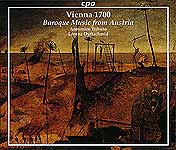A grim detail of Der Triumph des Todes (the Triumph of Death) by the late-Renaissance master Pieter Brueghel was chosen as cover art for this program of music composed more than a century later because it alludes to the plagues and other catastrophes that would have such a considerable influence on Viennese composers during the 1700s. Nearly all of the works offered are less than hopeful sacred settings, and the few secular ones such as the Battalias by Biber and Kerll, Biber’s Pauernkirchfahrt, and Schmelzer’s Polnische Sackpfeiffen are laced with programmatic references to war and other disconcerting events. However, if death was to be the overriding subject, these composers apparently were determined to experiment, if not have as much fun as possible undermining its dark consequences.
The majority of the program is devoted to Austria’s most important composer of the period, Johann Joseph Fux. Among his four sacred settings, the 1704 Te Deum (which receives its premiere recording here) is the longest, largest, and most spectacular of the lot. This magnificent, highly-charged, rapidly evolving piece is on par with any similar setting of its day. Fux’s grand Magnificat also is a stunner with alternating solo and tutti passages that are periodically endowed with highly inventive clusters of choral polyphony.
The instrumental selections are generally well played, though given the greater recorded competition for these pieces, they impress somewhat less. In the famous second-movement Allegro of Biber’s Battalia, where eight different melodies are played simultaneously to allude to a group of drunken musketeers, this performance by Armonico Tributo sounds almost polite when compared to Concentus Musicus Wien’s convincingly inebriated collapse (Teldec) or Il Giardano Armonico’s exquisite dissonant antics (also on Teldec). Biber’s Pauernkirchfahrt and Schmelzer’s Polische Sackpfeiffen suffer from a similar lack of abandon, especially in comparison to the imaginatively fierce, passionate renderings of the Musica Antiqua Koln (Archiv).
CPO’s sound is excellent, with life-like clarity and convincing instrumental and choral balances. In sum, while in a handful of instances other renditions are more evocative, Armonico Tributo delivers consistently respectable performances, and this fine compilation loaded with premiere recordings and rarities surely will be of interest to fans of the period. Recommended.
































